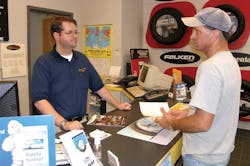Back in the “good ole days” when I began selling tires and service at the sales counter there was a popular saying — “Nobody walks.”
This was based on the idea that you probably had a tire in stock to fit the customer’s need. If they were in the store, you should have been able to close the sale if you used the “famous five steps to a tire sale.”
Today, consumers have much greater access to the latest, up-to-date information — Consumer Report, online publications, and, of course, online search engines such as Google, Yahoo, MSN, Bing and more. Many retailers I have spoken with have reported that customers are less inclined to buy when in the store, and often see the store as part of the search process. During these times of rapid change and transition, business as usual will not work!
It’s been my experience that employees are aware that change is necessary, and will look to management to point the way. If direction is not given, then employees will adapt as they see fit. This may or may not be in the best interests of the business. If management does not soon give the required new direction, before long, an “unmanaged” and perhaps “dysfunctional” pattern will become the new norm. You can’t hide from change, it must be managed!
The Zat Method
One of the key advantages of a local retailer has always been personal service. Personal service means professional service, so beware of the standard old approach and standard old answers when consumers are checking for information either on the phone or in person. Old answers don’t work, and some of them never did.
The following age-old reply is negative and lazy. It requires no creativity or thought. Have you ever heard this one: “I don’t have that tire”? Though it may be true, it’s not helpful, nor professional. A consumer can call any tire store and get that reply!
The fact is, a consumer can call a donut shop and get that answer: “I don’t have that tire.”
The answer that says, “I don’t have your tire, but I can get it,” is repeated daily in tire stores across the nation, more frequently now as a result of SKU proliferation, as mentioned earlier.
I’m going to suggest a method that I hinted at last month and that I have taught hundreds and hundreds of store personnel. The concept is simple: Sincerely ask for information, and seek immediate confirmation of how the potential customer feels about your answers. I call it the “Zat Method.”
I used the following example last month: “I don’t currently have your tire size in stock. May I have your name and the best way to reach you? I’ll do some research and get back to you with a price and availability as soon as possible — no later than noon today. How’s Zat sound?”
That is a huge difference from, “I don’t have your tire, but I can get it.”
[PAGEBREAK]
By asking, “May I have your name?” the sales person is making it personal. Offering “price and availability” and to “get back” to the customer, the sales person is demonstrating a positive approach in assisting the customer. When you don’t have it, you’ve got to say something more than, “I don’t have it.”
As I stated earlier, the chances of an out-of-stock condition are greater now than ever for a variety of reasons. Reporting to customers your current inventory status is just counter-productive.
Next is “The Recital.” Equally as unprofessional as the “out-of-stock report” is, so is “The Recital.” This is a result of our computer age.
The customer contacts a sales person that has positioned him or herself in front of the computer monitor and starts “reciting” what they are seeing on the screen.
On the phone it sounds particularly ridiculous, the sales person mumbling something like this: “Well, we don’t have the one you’re looking for... ahhh... well... wait a minute... yeah... we have one, but we don’t have any of the rears... well, maybe we could... ahhh... no, that’s not gonna’ work... we have the WhamBam 350, but they’re not on sale any longer... the rebate was over last week, I think... wow... doesn’t look like we have a set of anything.” Then to the famous fall back, “I don’t have it, but I can get it.”
Of course it all sounds like needless rambling because that’s what it is. I have heard this over and over again as I have phone-shopped tire dealers. I don’t know if it’s worse on the phone or at the sales counter. At the counter the sales person is fixated on the monitor and mumbles without making eye contact. The customer feels ignored or invisible. As the seconds turn into minutes, the customer’s confidence is lost, and so are the chances of a sale.
Out-of-stock conditions have always been a part of the retail tire business. With the explosion of additional SKU’s, the frequency of out-of-stock continues to increase, and better answers are required to provide good customer service. A confident answer or reply is required to earn the customer’s confidence, and their business.
Here are a few examples from the Zat Method: “Several tire manufacturers produce good quality tires at fair prices. Will you permit me to research price and availability, and contact you in a few hours? How’s Zat sound?”
In each of these cases the sales person remains in charge of the conversation.
It never ceases to amaze me how sales people can tell the customer what they “can’t do” or “don’t have,” and relinquish control of the presentation to the customer.
I was visiting a dealer just a few months ago. They have instructed their counter sales people not to quote prices on a particular global/national brand without first shopping the local market. They never quote a price without checking costs and selling prices in the surrounding marketplace.
This dealer is seeing sales increases during the current economic downturn. They are successful because they are managing the changes in the marketplace. They have managed change and have a disciplined sales team. They have trained for results and they are enjoying the results.
My “take-away,” closing comment is this: Don’t allow short, negative replies by you or your counter sales staff.
No more, “I don’t” or “I can’t.” It comes across as “I won’t” and “I’m lazy.”
Don’t let someone stare at the computer screen and mumble meaningless chatter; rather, take the positive approach: “It doesn’t appear that I have your size in stock at the moment. Will you permit me to take your number and call you back momentarily with a price both for the tire and our complete price? We guarantee our prices.
How’s Zat sound?” ■
Wayne Williams is president of ExCell Marketing Inc., a “counter intelligence” firm based in La Habra, Calif. He can be reached at [email protected].

